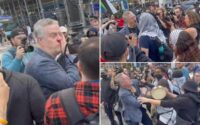ABC News cuts RFK Jr. vaccine remarks out of interview
An ABC News host admitted the network edited statements Robert F. Kennedy Jr. made about the COVID-19 vaccine out of an exclusive interview it conducted with the longshot Democratic presidential candidate.
“We should note that during our conversation, Kennedy made false claims about the COVID-19 vaccines,” anchor Linsey Davis said in a disclaimer when the interview aired Thursday. “We’ve used our editorial judgment in not including extended portions of that exchange in our interview.”
“Data shows that the Covid-19 vaccine has prevented millions of hospitalizations and deaths from the disease,” Davis added. “He also made misleading claims about the relationship between vaccination and autism.
“Research shows that vaccines and the ingredients used in the vaccines do not cause autism, including multiple studies involving more than a million children and major medical associations like the American Academy of Pediatrics and the advocacy group Autism Speaks.”
Davis is the latest legacy media journalist to admit to editing interviews to flatter liberal viewers. Former NBC “Today” Show host Katie Couric admitted to having withheld a segment of an interview with the late Ruth Bader Ginsburg that featured the Supreme Court justice calling kneeling protests during the US national anthem “a terrible thing to do.”

Couric said she made the edits to “protect” the 83-year-old Ginsburg, who she believed was “elderly and probably didn’t understand the question,” according to her memoir “Going There.”
ABC’s segment on vaccines briefly featured Kennedy’s response to past comments he made on links between vaccines and autism, before cutting to questions about the candidate’s famous political family.
The 69-year-old son of former US attorney general and senator Robert F. Kennedy rose to prominence as an outspoken opponent of vaccination, to the occasional embarrassment of his fellow famous family members.


A Fox News poll released Wednesday showed that 19% of Democratic primary voters nationwide back RFK Jr.’s challenge to Biden, whom 62% of party voters support.
Another 9% support self-help guru Marianne Williamson, who declared her intention to seek the Democratic nomination last month.
Sitting presidents are rarely challenged from within their own party, and history indicates double-digit support for an insurgent candidacy is a sign of weakness in the incumbent. In 1992, Pat Buchanan challenged then-President George H.W. Bush and got 22% of the Republican primary vote.
Twelve years earlier, then-Sen. Ted Kennedy managed 37% of the Democratic primary vote against Jimmy Carter. Both presidents were defeated in their re-election bids.
Kennedy, who launched his campaign in April, told Davis during their interview that he was challenging Biden because the president’s leadership was at odds with longstanding Democratic priorities.
“I don’t believe that we should be the party of war; I don’t believe that we should be the party of Wall Street; I don’t believe that we should let neocons dictate our foreign policy, and I don’t believe in censorship,” Kennedy said. “And those are all values that are traditional Democratic Party values that this White House has departed from.”
Kennedy’s extended family have said they are unlikely to support his 2024 run, given his attacks on former White House chief medical adviser Dr. Anthony Fauci and calls for his father’s convicted assassin, Sirhan Sirhan, to be paroled by California Gov. Gavin Newsom.


